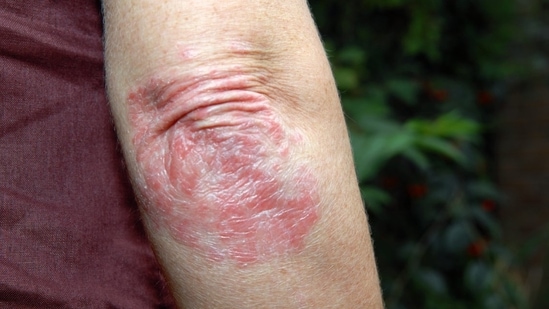From hindustantimes.com
It is estimated that nearly 80-90 percent of people living with psoriasis have plaque psoriasis. Have you ever heard of Plaque Psoriasis? Here's all you need to know about its causes, symptoms and treatments along with foods to eat and avoid to prevent this disease
It is estimated that nearly 80-90 percent of people living with psoriasis have plaque psoriasis. In an interview with HT Lifestyle, Dr Sunil Tolat, Consulting Dermatologist in Pune, explained, “The disease causes rough, thick, scaly, discoloured plaques to develop on the skin. It usually affects the elbows, back, knees and scalp. However, in certain cases, it can affect the entire body including the face, feet, hands, legs and the genital area.”
Causes of Plaque Psoriasis
Dr Sunil Tolat said, “It is an immune system disorder. In the case of plaque psoriasis, the immune system overreacts, causing inflammation, which causes new skin cells to grow too fast. Usually, new skin cells grow every twenty-eight days to thirty days. But for those affected with plaque psoriasis, new cells grow and move to the skin's surface every 3 to 4 days. This build-up of new cells replacing old cells results in the formation of plaques. Plaque psoriasis also runs in families, so there can also be a genetic trigger. Parents may pass it down to their children.”
Symptoms
According to Dr Sunil Tolat, psoriasis plaques normally appear as inflamed, raised and scaly patches on the skin that may also be itchy and painful. He elaborated, “On Caucasian skin types, plaque psoriasis appears as raised, red patches covered with a white build-up of dead skin scale or cells. However, for people with skin of colour, the psoriasis plaque may appear darker and thicker and more of a greyish or purple colour or darker brown.”
He listed the common symptoms of plaque psoriasis as:
● Discoloured, raised plaques with a silvery or white surface
● Itchiness
● Cracks (fissures)
● Irritation or pain
● Bleeding
Treatment
Dr Sunil Tolat revealed that the majority of dermatologists usually start with the easiest and least invasive treatments where first-line treatments normally include:
● Vitamin D analogues
● Topical corticosteroids
● Salicylic acid ointments
Other than that, he shared that a class of oral medicines called disease-modifying antirheumatic drugs (DMARDs) can also slow down or stop specific conditions that result from an overactive immune system. These can include:
● Acitretin (Soriatane)
● Apremilast (Otezla)
● Cyclosporine
● Methotrexate
● Biologics(Scapho)
Dr Sunil Tolat suggested, “Phototherapy is another common treatment for plaque psoriasis. Since it is non-pharmaceutical, it’s a popular choice for people before systemic medications. Some people are also able to get relief from the symptoms and improvement in their condition through daily limited sessions of sun exposure. Other people fare better using phototherapy. Because of skin cancer risks, controlled phototherapy is recommended by dermatologists over sun exposure at regular intervals. Studies have indicated that people who have dark skin tones may require higher doses of phototherapy compared to people with light skin tones.”
Foods to eat and avoid
Dr Sunil Tolat insisted that an anti-inflammatory diet can help limit plaque psoriasis flare-ups where foods that have anti-inflammatory properties include:
● Leafy greens like spinach and kale
● Oily fish like salmon, mackerel or sardines
● Olive oil
Foods and drinks that may cause flare-ups may include:
● Dairy, including cow’s milk and eggs
● Alcohol
● Citrus fruits like lemons and oranges
● Gluten
● Nightshade vegetables including potatoes, peppers and tomatoes
Plaque psoriasis is no doubt a painful and uncomfortable condition. It may flare up and go into remission throughout your life, but it can generally be well-managed with treatment.

No comments:
Post a Comment